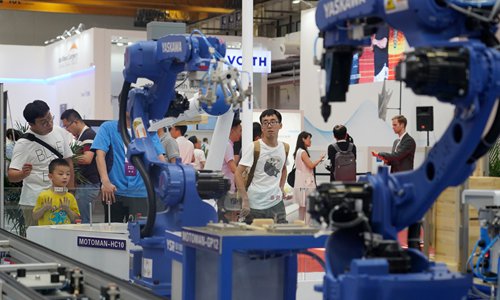HOME >> BUSINESS
China's industrial robot sales slip in 2018, but growth remains potential huge
By Chi Jingyi Source:Global Times Published: 2019/7/11 19:53:40

Industrial robots displayed at an exhibition held in Beijing File photo: VCG
Total sales of industrial robots in China fell for the first time in 2018, according to data from the China Robot Industry Alliance (CRIA), a decline that insiders attributed partly due to downward pressure on the domestic economy.
However, the nation's robot market can still achieve huge growth because there are many application scenarios as China automates its manufacturing sector. The figures also showed that domestic models took up a greater share of the market last year.
In 2018, 135,000 industrial robots were sold in China, down 3.75 percent year-on-year, CRIA data showed.
"The sales decrease is a response to downward pressure on the domestic economy, which has affected manufacturing activity and demand for industrial robots," Chen Ji, an analyst at the Capital University of Economics and Business, told the Global Times on Thursday. Chen said the situation would soon change as the economy is resilient enough to counter external pressure.
Analysts have estimated that China's GDP grew 6.3 percent year-on-year in the first half of 2019, which would fall in the stable range set by the policymakers.
Despite the overall decline, sales of proprietary brand robots grew 16.2 percent to 43,600 units, while foreign-brand robot sales fell 10.98 percent to 92,000 units. Domestic robots accounted for 32.2 percent of total sales, up 5.5 percent from the previous year, CRIA data showed.
"The quality of domestic robots improved and the costs fell compared with imported robots," said Chen.
Experts noted the decline would also be temporary as China has huge demand for industrial robots. "China has a huge market for robots as the country's labor force ages," said Chen. "China needs more robots to replace manual labor, especially in the manufacturing industry."
China topped industrial robot sales in the world for six consecutive years.
Nevertheless, robot use in China is limited to certain industries. For some sectors, such as logistics, robots are still too expensive, Xu Yong, chief advisor of cecss.com, a logistics market research platform, told the Global Times on Thursday.
"China has been promoting research and development of smart robots to reduce the costs of mechanization and automation, and breakthroughs have also been made," Xu added.
For example, delivery robots are undergoing tests, Xu said. "The robots will distinguish customers through facial recognition or passwords and will go back to dealer stations after making deliveries."
Newspaper headline: Industrial robot sales slip in 2018, but growth remains potential huge
Posted in: INDUSTRIES,MARKETS